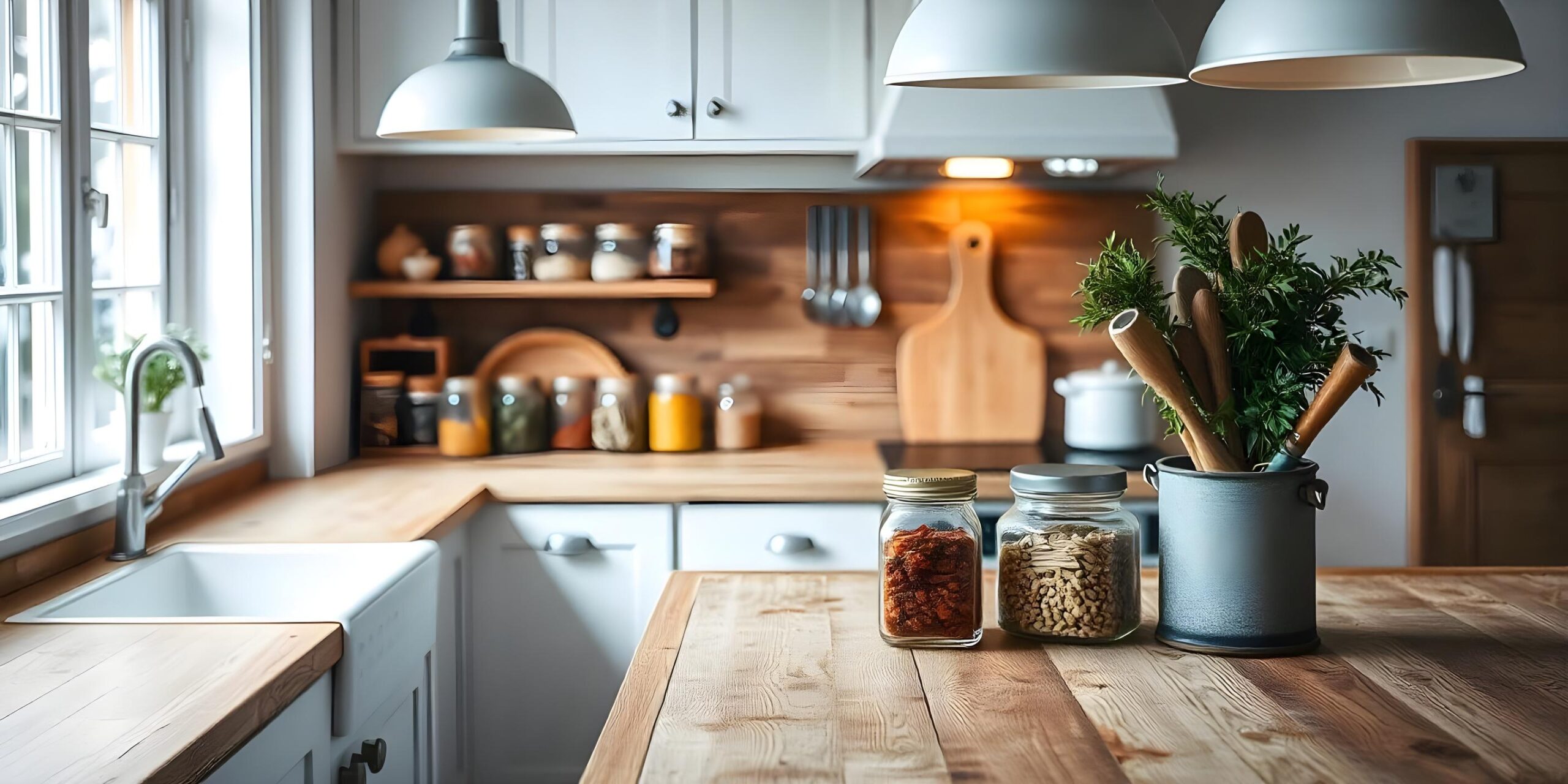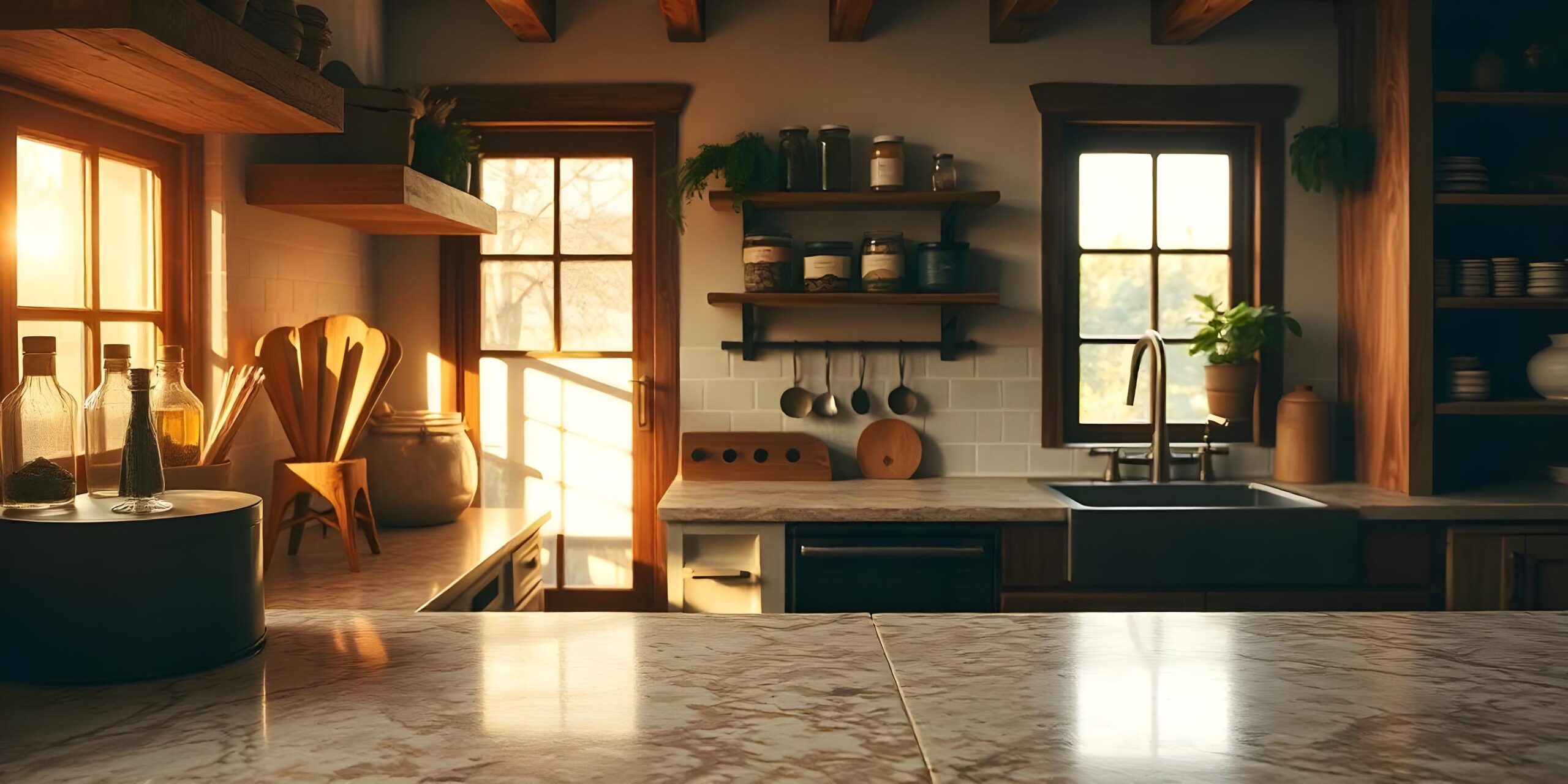Designing a modern kitchen requires the implementation of some tips. Below are some of the best ways that can be followed to create and design a modern kitchen.
Designing A Modern Kitchen: Start With A Vision
Designing a modern kitchen starts with a well-defined concept that marries functionality and aesthetics. First, determine what the kitchen is for – gourmet cooking, entertaining, or the family hangout. This clarity will set the basis of every decision to follow.
Collect your ideas from resources like Pinterest, Instagram, and design magazines to pinpoint your preferred style-minimalist, industrial, or Scandinavian. Your vision should also echo your lifestyle, for instance, the minimalist design with handleless cabinets and integrated appliances might appeal to a tech-savvy personality, but bold backsplashes and open shelving could suit a creative personality.
Next, consider how the kitchen will interact with other spaces in your home. An open-concept kitchen can give way seamlessly into the living or dining area, while closed might be best for those who seek privacy. Not to forget functionality – think about practical elements that provide more storage through custom cabinetry or create an ergonomic layout by adhering to the classic work triangle.
Your vision should also take modern trends into consideration, such as eco-friendly materials or smart appliances, to future-proof your design. Think about the colours, the materials, and textures that speak to you-ensure they balance between timeless elegance and modern flair. A clear vision not only makes the design process much easier but also helps to ensure the result will be a reflection of your personality and your daily life. This first step lays the base for a modern kitchen that is as functional as it is beautiful.
Designing A Modern Kitchen: Bringing The Concept To Life

Bringing the concept to life is the most exciting phase of designing a modern kitchen, where ideas transition into reality. One starts by engaging the services of experienced professionals — architects, designers, and contractors who ensure that your vision flows seamlessly.
Engaging experts helps in addressing challenges, refining layouts, and selecting materials that blend durability with aesthetics. Customisation plays a major role in making it a space fully reflecting your style and preferences. Choose between custom cabinetry, custom countertops, or a unique backsplash to give the kitchen that personal touch. Attention to detail is key in construction. One needs to closely monitor the progress made to ensure no deviation from timelines and quality of each element is achieved as required.
@ampquartzcabinets Solid Plywood Kitchen Cabinet Good or Not?! Is Solid Plywood Kitchen Cabinet really good enough for your kitchen? Let's find out! AmpQuartz SolidPlywood Kitchen KitchenCabinet
♬ original sound – AmpQuartz – AmpQuartz
Choose innovative technology, such as smart appliances or voice-activated lighting, that will add function and efficiency. Modern kitchens are all about clean lines and minimalism, so focus on built-in storage options, handleless cabinets, and integrated appliances that present a sleek, clutter-free appearance. Finally, finish off the space with thoughtful decor and practical items, such as stylish pendant lights, greenery, or designer stools at the island. Finishing touches, like a durable backsplash or scratch-resistant countertops, complete the look while ensuring longevity.
From its concept to completion, bringing a modern kitchen to life is the harmonious marriage of creativity, practicality, and precision. The end result, if carefully planned and executed, is a truly stunning, functional space that becomes the heart of the home.
Designing A Modern Kitchen: Maximising Efficiency
Efficiency will be the most important factor in making a modern kitchen practical and beautiful. It has to be considered from design to completion in order to create a good workflow. One of the main methods of effectively realising a space for easy movement between the three primary work zones includes placing the stove, sink, and refrigerator in a triangular manner on the floor – the work triangle.
Other main features include the island, which allows for additional counter space to perform preparation, as a breakfast bar, or for further storage with cabinet and drawer options. Smart appliances could also be added to make life easier – sensor-activated dishwashers, ovens with touch controls, and refrigerators with cameras inside them help keep track of groceries.
Storage solutions also play a vital role in reaching the maximum level of efficiency. Pull-out drawers, lazy Susans, and pull-out pantries enable easy access without having to waste a lot of time rummaging through what is stored. In-built spice racks or utensil drawers are forms of compact storage that reduce clutter on the countertops. Other areas of concentration are lighting — task lighting under cabinets to light the work areas and ambient lighting for an overall well-lit atmosphere.
Finally, minimalist design reduces visual clutter so users can better focus on the essentials and keep the kitchen functional. Keeping these elements in mind right from the beginning, you will be able to plan a kitchen which is not only beautiful but also very functional.
Designing A Modern Kitchen: Investing In Functional Fixtures

Equipping with functional fixtures is very essential during designing and renovating a modern kitchen from scratch since features will be there to affect the functionality and aesthetic outlook of the place. Apart from that, faucets, sinks, and hardware for the cabinets are key to providing seamless efficiency in a smooth kitchen.
Core investments include a quality, touch-less faucet for convenience of hands-free operation and hygiene, reducing cross-contamination. Further, deep and spacious sinks made of durable materials such as stainless steel or quartz provide enough space to wash dishes and prepare food. Modern faucets with pull-out or pull-down spouts allow greater flexibility in cleaning larger pots and pans.
@ampquartzcabinets I DON'T WANT KITCHEN CABINET! I don't need a Kitchen Cabinet! I want to save money! Also me after seeing AmpQuartz's Kitchen Cabinets: AmpQuartz KitchenCabinet Funny
♬ original sound – AmpQuartz – AmpQuartz
Cabinet hardware is another important part of functional fixtures. Sleek, minimalist handles or handleless designs help achieve a modern streamlined look and improve ease of use. Soft-close mechanisms for both drawers and doors do not only prevent slamming but also add to their longevity. In itself, a well-designed kitchen island could be considered a functional fixture, acting as both workplace and locale of social congregation. That will cover the inclusion of smart appliances in such kitchens, which need only touch operations. The integration of this range of smart touch-controlled and energy-efficient appliances facilitates a functional modern kitchen well into the future.
These subductions, function-based, give good flow to an entire kitchen space and make the kitchen practical by being stylishly functional. Functional investment in fixtures would finally prove your kitchen is modern at all points-a synonym for style versus functionality.
Designing A Modern Kitchen: Adding Final Touches
Finishing a modern kitchen is all about bringing your design concept into reality and making it functional, as well as beautiful. Once major elements such as cabinetry, countertops, and appliances have been installed, it's time to work out the details.
Begin with decluttering the space to retain that clean, minimalist look characteristic of modern kitchens. Allow key design features to be in focus by keeping items that are not necessary off the countertops. Add sleek, modern kitchenware to it – elegant utensils, cutting boards, or stylish storage jars. Add some greenery, such as succulents or herbs, in very chic planters to give life to the space and make a great pop against neutral tones in your kitchen.
Lighting sets the tone for the space, so complete it with accent lighting through pendant lights or strategically placed LED strips that draw attention to key design features, such as a beautiful backsplash or unique countertops. Add any art pieces or sculptures that reflect your personal taste, but do not forget to balance and not make the area cluttered. Finally, fashionable yet practical accessories, such as designer dish towels, modern backsplash mosaics, or decorative trays, will complete the entire kitchen without leaving anything to chance.
These last touches not only raise the level of design but also make your kitchen cohesive and personalised. Attention to these last steps in design will result in a modern kitchen that is inviting and just perfect for cooking, socialising, and other daily activities.





